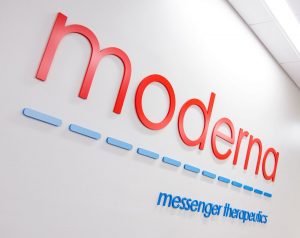Coming off of biotech’s largest ever initial public offering last year, Cambridge, Massachusetts-based Moderna announced last week that it has continued to build up its clinical pipeline, moving several new drug candidates into Phase I clinical trials and advancing another into Phase II clinical testing.
In its second quarter business update and financial earnings report, the company revealed that it has launched four new Phase I clinical trials. These include two in immune-oncology and two in infectious diseases. Moderna also said that the first patient in the Phase II study of its melanoma vaccine has consented to the trial.
In the area of infectious disease, Moderna’s newest Phase I studies focus on mRNA-1172, a potential vaccine for respiratory syncytial virus (also known as RSV), and mRNA-1893, a vaccine for the Zika virus. The company’s immune-oncology Phase I trials include a study of the KRAS cancer vaccine mRNA-5671 and an mRNA-encoding IL12 therapy.
Both the RSV vaccine and the KRAS cancer vaccine are under development through a partnership with Merck & Co., while the IL12 therapy is being developed through a partnership with British pharmaceutical company AstraZeneca’s MedImmune subsidiary.
Moderna’s Phase II study will be testing the drug mRNA-4157, a personalized cancer vaccine aimed at high-risk melanoma. Primarily sponsored by Moderna, the trial is called KEYNOTE-942 due to its co-sponsorship by Merck and involves the administration of the vaccine alongside Merck’s PD-1 checkpoint inhibitor Keytruda. The trial is set to enroll 150 patients with an anticipated final completion by the end of 2021.
The company also announced that its exclusive research collaboration and licensing agreement with Vertex aimed at discovering and developing mRNA therapeutics for the treatment of CF has been extended through at least the first quarter of 2020.
Following Moderna’s release of its second quarter business updates and financial results, the company’s shares on the Nasdaq climbed 14 percent. The company initially made its stock market debut in November 2018, successfully raising over $600 million in what was regarded as the largest ever IPO by a biotechnology company.























